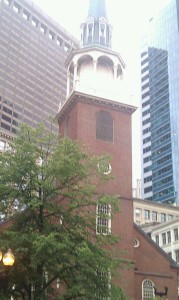A couple of years ago I had the opportunity to participate in a panel discussion at an event in Boston. I had never been to the city and was hoping to do a little sight seeing while there. Unfortunately the rainy weather and my tight schedule eliminated the opportunity to visit Fenway Park. That was a big disappointment. I was pleased when I had a couple of open hours that happened to correspond to a relatively nice afternoon. The hotel was within walking distance of Boston Common, so I set off on foot hoping to take in a few of the sites along the Freedom Trail.

After spending some time enjoying the area and soaking up the history, I turned back in the direction of my hotel. I didn’t have any definite objective and was just walking and praying. I turned a corner and there was Old North Church, a reminder of our history that is dwarfed by the modern downtown that has grown up around it.
At the time of the American Revolution, the 190 foot tall steeple was easily the tallest structure in Boston and was visible all around the city and across the Charles River in Charlestown. In April of 1775 the British had over 4000 soldiers stationed in Boston with the intent of capturing stockpiles of weapons and ammunition in the neighboring countryside. Colonial spies were able to discover that two regiments would be sent to Concord where a particularly large cache of munitions was hidden. What they did not know was when the British would leave or which route they would travel.
The Colonial plan was to send riders ahead of the advancing British to Lexington, half way to Concord, where they would warn John Hancock and Samuel Adams. Unsure if he would be able to escape Boston to give the warning, Paul Revere came up with the now well known plan to warn his allies on the other side of the river of the British advance. Riders stood by each night in Charlestown, ordered to watch the steeple of North Church for the signal. If they saw a single lantern the British would head out on the longer land route. Two lanterns signaled the army would row across the river in the more direct path to Concord.
When British forces started putting their boats into the river on the night of April 18th, Revere sent trusted accomplices to North Church to display two lanterns. An hour later when he reached Charlestown on the far side of the river, Revere discovered riders had seen the signal and already left for Lexington. The next morning when the unsuspecting British reached Lexington they found an armed and ready militia rather than the sleepy village they anticipated. It was in this encounter that a shot rang out, the “shot heard around the world” and the revolution was underway.
The events that transformed the nation had their beginning in light shining forth from the church. Today, culture is in need of transformation. We are the light of the world. We have been tasked with shining forth the light of His glory, the very essence of who He is. It is us reflecting Him that will illuminate the marketplace, the campus, the studio, or the neighborhood. It is His glory, hidden in our earthen vessels, that is needed to bring about the revival we long to see. Wherever you go today, be an influence for Him.